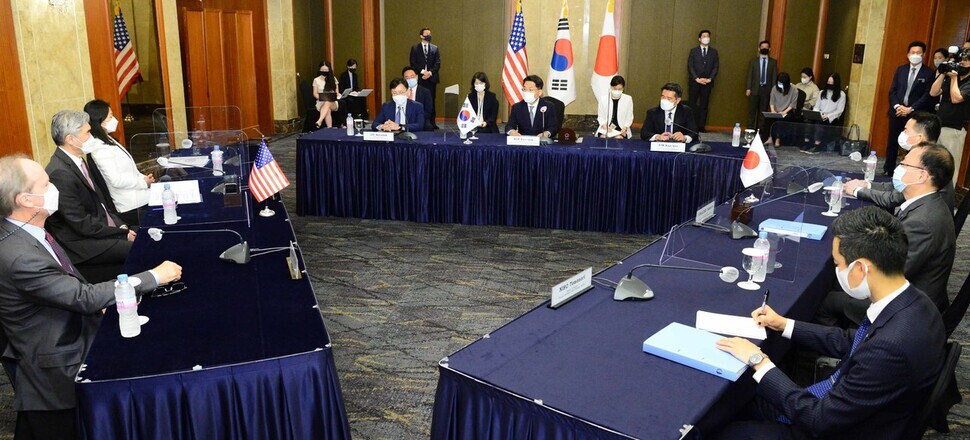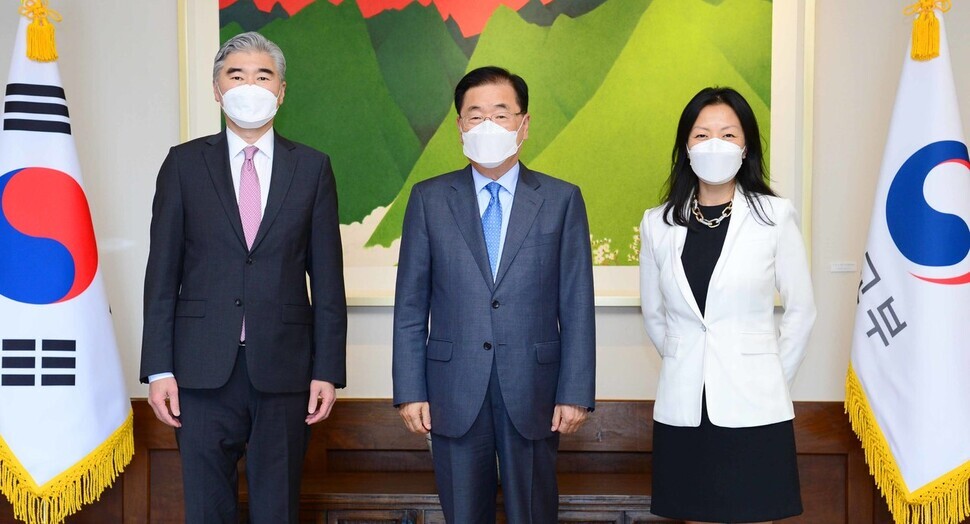hankyoreh
Links to other country sites 다른 나라 사이트 링크
US hopes N. Korea will respond to US outreach for dialogue, Sung Kim says

Sung Kim, the US State Department’s special representative for North Korea, said that the US hopes that “the DPRK will respond positively for our outreach and our offer to meet anywhere, anytime without preconditions” during meetings with South Korea and Japan’s senior envoys on the North Korean nuclear issue on Monday. Kim is currently on a trip to South Korea.
Kim described US policy as calibrated, practical, and open to diplomacy with North Korea prior to a trilateral meeting with his South Korean and Japanese counterparts at a hotel in Seoul on Monday.
Kim sent another message asking North Korea to come to the table for dialogue in an earlier meeting on the same day with Noh Kyu-duk, South Korea’s special representative for Korean Peninsula Peace and Security Affairs.
Significantly, Sung Kim also responded to North Korean leader Kim Jong-un’s remarks about the North needing to “be prepared for both dialogue and confrontation.” Sung Kim said he hopes Kim Jong-un’s remarks indicate that the North will respond positively to the US’ overtures.
The American envoy went on to say that the US “will be prepared for either” — that is, dialogue and confrontation — underscoring Kim Jong-un’s remarks about dialogue.
But he also said the US will continue to implement UN Security Council resolutions until North Korea engages with the US.
In his opening remarks, Noh Kyu-duk said that “South Korea and the US will continue to play the role needed to quickly resume dialogue with North Korea through consultation and coordination.”
Following deliberations on Monday, Sung Kim said that he’d reiterated the US’ support for inter-Korean dialogue, cooperation and engagement.

After their bilateral meeting, Kim and Noh held a trilateral meeting with Takehiro Funakoshi, director-general of the Asian and Oceanian Affairs Bureau at Japan’s Ministry of Foreign Affairs and Japan’s senior envoy on the North Korean nuclear issue. Subsequently, there was also a meeting between Noh and Funakoshi.
In an interview with ABC on Sunday, White House national security adviser Jake Sullivan said that Kim Jong-un’s recent remarks were an “interesting signal.”
“We are awaiting a clear signal from Pyongyang as to whether they are prepared to sit down at the table,” Sullivan said.
That was the first specific response by a senior American official to Kim Jong-un’s indication that he’s open to dialogue in his reference to being “prepared for both dialogue and confrontation” in the 3rd Plenary Session of the 8th Central Committee of the Workers’ Party of Korea on Thursday.
“The clear signal they could send is to say, yes, let’s do it. Let’s sit down and begin negotiations,” Sullivan said.
“We think that [...] there’s no substitute for diplomacy to begin to make progress towards that ultimate objective — the complete denuclearization of the Korean Peninsula.”
By Kim Ji-eun, staff reporter
Please direct comments or questions to [english@hani.co.kr]

Editorial・opinion
![[Column] Season 2 of special prosecutor probe may be coming to Korea soon [Column] Season 2 of special prosecutor probe may be coming to Korea soon](https://flexible.img.hani.co.kr/flexible/normal/500/300/imgdb/original/2024/0426/3317141030699447.jpg) [Column] Season 2 of special prosecutor probe may be coming to Korea soon
[Column] Season 2 of special prosecutor probe may be coming to Korea soon![[Column] Park Geun-hye déjà vu in Yoon Suk-yeol [Column] Park Geun-hye déjà vu in Yoon Suk-yeol](https://flexible.img.hani.co.kr/flexible/normal/500/300/imgdb/original/2024/0424/651713945113788.jpg) [Column] Park Geun-hye déjà vu in Yoon Suk-yeol
[Column] Park Geun-hye déjà vu in Yoon Suk-yeol- [Editorial] New weight of N. Korea’s nuclear threats makes dialogue all the more urgent
- [Guest essay] The real reason Korea’s new right wants to dub Rhee a founding father
- [Column] ‘Choson’: Is it time we start referring to N. Korea in its own terms?
- [Editorial] Japan’s rewriting of history with Korea has gone too far
- [Column] The president’s questionable capacity for dialogue
- [Column] Are chaebol firms just pizza pies for families to divvy up as they please?
- [Column] Has Korea, too, crossed the Rubicon on China?
- [Correspondent’s column] In Japan’s alliance with US, echoes of its past alliances with UK
Most viewed articles
- 1After election rout, Yoon’s left with 3 choices for dealing with the opposition
- 2AI is catching up with humans at a ‘shocking’ rate
- 3Noting shared ‘values,’ Korea hints at passport-free travel with Japan
- 4Why Kim Jong-un is scrapping the term ‘Day of the Sun’ and toning down fanfare for predecessors
- 5Two factors that’ll decide if Korea’s economy keeps on its upward trend
- 6South Korea officially an aged society just 17 years after becoming aging society
- 7Korea’s 1.3% growth in Q1 signals ‘textbook’ return to growth, says government
- 8Is Japan about to snatch control of Line messenger from Korea’s Naver?
- 91 in 5 unwed Korean women want child-free life, study shows
- 10[Reportage] On US campuses, student risk arrest as they call for divestment from Israel